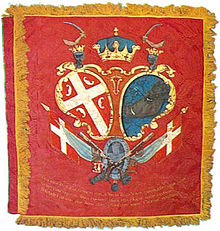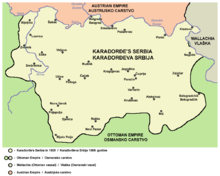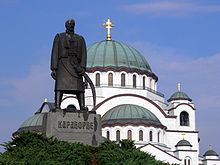- Karađorđe Petrović
-
Đorđe Petrović Karađorđe
Ђорђе Петровић КарађорђеGrand Vožd of Serbia 
Reign 14 February 1804 – 21 September 1813 Born 3 November 1768 Birthplace Viševac, Ottoman Empire (modern day Serbia) Died 24 July 1817 (aged 48) Place of death Radovanjski Lug, Ottoman Empire (modern day Serbia) Predecessor First Serbian Uprising
noneSuccessor Second Serbian Uprising
Miloš Obrenović IConsort Jelena Jovanović Offspring Alexander Karađorđević Royal House House of Karađorđević Religious beliefs Orthodox Christian Đorđe Petrović (Serbian pronunciation: [ʥɔ̂ːrʥe̞ pě̞trɔv̞iʨ kâraʥɔːrʥe̞]; Serbian: Ђорђе Петровић Карађорђе, Anglicised: George Petrovich; 3 November 1768 – 24 July 1817), known as Karađorđe (Black George), is regarded as the founder of modern Serbia, he was the initiator of the Serbian Revolution. He led the First Serbian Uprising against the Ottoman Empire (1804-1813), defeating the Ottoman Turks in several battles; this resulted in a short-lived state which he would administrate as Grand Leader (Veliki Vožd), alongside the newly found Narodna Skupština (People's Assembly) and Praviteljstvujušči Sovjet (Governing Council), simulating a wholly functional government in war-time.
Petrović was known as Karađorđe (Black George, Crni Đorđe / Црни Ђорђе), a nickname that Turks gave him because of his bellicosity and commoner background ("kara" is black in Turkish). He is the founder of the House of Karađorđević.
Contents
Life
Origin and early life
Karađorđe's family drew descent from the Vasojevići clan, that according to folklore was founded by Vaso, a great grandson of Stephen Constantine of the Nemanjić dynasty (that ruled Medieval Serbia, 1166-1371).[1] According to Radoš Ljušić, his ancestors most likely migrated to Šumadija along with the Highland clans of Herzegovina and Montenegro, during the Second Great Serb Migration in 1737-1739 under the leadership of Patriarch Šakabenta, as a result of the Austrian-Turkish War in which Serbs took part.
Đorđe was born on November 3rd, 1768, in the village of Viševac, then part of the Ottoman Empire (today's Rača municipality, Šumadija District) to father Petar (hence his surname Petrović) and Marica née Živković (from Masloševo, in Stragari). His family was poor, their situation progressed as Karađorđe began working for affluent Serbs and Turks.
He married Jelena Jovanović in 1785. Jelena is thought to have come from a wealthy background, thus her family didn't accept his marriage proposal. Karađorđe took her and married her without the parents' conscent, and they didn't stay long in Serbia, as he had killed a Turk. He fled with his family to Syrmia in ca 1787. Karađorđe lived and worked in the Krušedol monastery.
Austrian-Turkish War
At the end of the Austro-Turkish War, 1787, amid Koča's Frontier Revolt, Karađorđe enrolls in the Freicorps[2] of the Austrian Army, fighting against the Turks. He took part in the botched attack on Belgrade, and fought in western[2] and southern Serbia, where he gained military experience.[2] In the mid-1791, peace is concluded, and Karađorđe receives a medal of honour. He then joins the Hajduks, where he leads a large band. The decline of Hajduks comes in 1793-4, when Karađorđe joins his family, living peacefully in Topola. He began working as a livestock merchant, trading over the border with the monarchy.[2]
War against the Janissaries
Ottoman opression against Serbs significantly increased in the beginning of 19th century when janissary leaders, the dahis, rebelled against the Sultan and seized the rule of the Sanjak of Smederevo. It culminated in January and February 1804, when dahis prepared executions of popular leaders, gentry, priests, former rebels and wealthy traders, dubbed the Slaughter of the Dukes, in which some 150 of the most notable Serbs where killed.[3] Karađorđe, among few other notable people, that would later intiate the Serb Uprising, survived the assassinations.
As a response to the executions, the Serbian population without a central figure took measures of self-defence, and spontaneously attacked the jannisaries.[3] Prota Mateja and several other leaders had organized military detachments that engaged the dahis in Valjevo.[4] on 14 February 1804, 300 notables met in Orašac, Aranđelovac where Karađorđe was chosen as the undisputed leader.[3] When Prota Mateja heard of this, he urged all Serb leaders to resist the dahis and the Ottoman authorities,[4] Mateja was appointed deputy-commander of Valjevo, and later acted as diplomat to Russia, Austria, Bucharest and Constantinople. By the spring of 1804, Karađorđe had 30,000 combat-ready men under his wing.[3] After May 1804, Karađorđe was titled Supreme Vojvoda.[3]
The Serbians managed to quickly organize a widespread revolt, under the pretext of liberation from the dahis, Karađorđe was successful in this, he terminated feudalism in the liberated areas of Serbia and installed his military commanders and local leaders as governors of nahis (administrative units), the dahis who refused to leave were captured and executed after the Serbian liberation of Belgrade]].
War against the Ottoman Empire
In March 1805, Karađorđe was officially appointed Military leader of Serbia, the self-proclaimed Vožd (old Serbian for vođa, "leader"). The Ottoman government welcomed the rebellion against the dahis and decided to install a new governor in Belgrade. Karađorđe, after tasting the fruits of liberty, decided not to let the new pasha enter the liberated area and defeated his army in the Battle of Ivankovac of 1805. This battle signified a turn of events, since the uprising was not a rebellion against the dahi terror anymore, but a war of liberation against the Ottoman rule. Karađorđe founded the Narodna Skupština (People's Assembly) and Praviteljstvujušči Sovjet (Governing Council)whose decree was drafted by Božidar Grujović (Teodor Filipović).
The rebels achieved several victories, including in the Battle of Mišar in 1806, and the Battles of Deligrad and Belgrade in 1806. At the end of 1806 Belgrade was freed from Ottoman rule. In 1807 Šabac and Užice were also freed.
In 1806-1807 a Serbian envoy to the Ottoman government in Constantinople Peter Ichko managed to obtain a favourable 'Ichko's Peace'. However, Karađorđe disavowed the agreement and aligned with the Russian Empire in a war against the Ottoman Empire.
"Therefore, dear Serb brothers...now when it's only up to us, take an example from those peoples who foster unity and order, for they have become mighty and prosperous; offer advises to each other, as the priests do, when they teach their flock: teach them the words of Christ, the ones which say: As I have loved you, so you also should love one another. Not so much by words, but by your deeds... by doing so, the end of our quest will bring out the old glory of Serbia to show, who we indeed are: the children of our glorious and brave ancestors"
In 1808, Selim III and his successor Mustafa IV, were both deposed and killed by Mahmud II. In midst of this political crisis, the Ottomans were willing to offer the Serbs a wide autonomy, however, the discussions led to no agreement between the two, as they couldn't agree on the exact boundaries of Serbia.[6] Karađorđe now declared himself hereditary supreme leader of Serbia, although he agreed to act in cooperation with the governing council, which was to also be the supreme court.[7] When the Ottoman-Russian War broke out in 1809, he was prepared to support Russia, the cooperation was, however, uneffective.[7] Karađorđe launched a successful offensive in Novi Pazar, but was subsequently defeated at Niš.[7] In August 1809, an Ottoman army marched on Belgrade, prompting a mass exodus of people across the Danube, among them Russian agent Radofinikin.[6] Facing disaster, Karađorđe appealed to the Habsburgs and Napoleon, with no success.[6] At this point, the Serb rebels were on the defensive, their aim was to hold the territories and not make further gains.[6][7]
In July 1810, Russian troops arrived in Serbia for the second time, this time some military cooperation followed; weapons, ammunition, and medical supplies were sent, and Marshal M. I. Kutuzov, the great commander, participated in the planning of joint actions.[7] The Russian assistance gave hope for a Serb victory, however, events in Europe were in the way.[7] Russia, faced with a French invasion, wished to sign definitive peace treaty, and acted against the interest of Serbia.[7] The Serbs were never informed of the negotiations; they learned the final terms from the Ottomans.[7] This, second Russian withdrawal, came at the height of Karađorđe's personal power, and rise of Serb expectations.[7] The negotiations that led to the Treaty of Bucharest (1812), had Article 8, dealing with the Serbs; It was agreed that Serb fortifications were to be destroyed, unless of value to the Ottomans, pre-1804 Ottoman installations were to be reoccupied and garrisoned by Ottoman troops, in return the Porte promised general amnesty and certain autonomous rights; The Serbs were to control "the administration of their own affairs" and the collection and delivery of a fixed tribute.[7] The reactions in Serbia was strong, the reoccupation of fortresses and cities was of particular concern and fearful reprisals were expected.[7]
In 1812, threatened by Napoleon's French Empire, Russia had to quickly sign a peace treaty with the Ottomans. In 1813, the Ottoman Empire launched a big assault on Serbia taking land all up to the rivers Morava and the river Drina, and Karađorđe, along with other rebel leaders, fled to the Austrian Empire on 21 September 1813.
Exile, Death and aftermath
 Tomb in Oplenac Royal Mausoleum.
Tomb in Oplenac Royal Mausoleum.
After some time, Karađorđe emigrated to Bessarabia, where he joined the Greek national liberation movement Filiki Eteria, where he became an active member.[8] The Greeks were primarily interested in using the Serbian lands as base of the Greek operations.[9] Miloš Obrenović was fully uncooperative.[8]
On 24 July 1817, days after he secretly crossed into Serbia to try to spearhead a new uprising, Karađorđe was assassinated in Radovanjski Lug by the men of Miloš Obrenović,[8] Vujica Vulićević and Nikola Novaković. This happened on orders of the Ottomans, who feared the possibility of a new uprising, while Miloš feared competition by the enormously popular Karađorđe.
Some[who?] have speculated that Karađorđe had no political ambitions and simply wanted to return home from the exile and informed Miloš of this in advance, who however did not believe such protestations and had Karađorđe killed. The assassination marked the beginning of feud between rival dynasties Obrenović and Karađorđević.[9]
Legacy
See also
References
- ^ R-J. V. Vesović, 1935, "Pljeme Vasojevići", Državna Štampa u Sarajevu, Sarajevo
- ^ a b c d History of the Balkans: Eighteenth and nineteenth centuries, p. 200
- ^ a b c d e History of the Balkans: Eighteenth and nineteenth centuries, p. 196
- ^ a b Serbian studies, p. 137
- ^ http://www.douklia.net/povest/proglasenije.html
- ^ a b c d History of the Balkans: Eighteenth and nineteenth centuries, p. 201
- ^ a b c d e f g h i j k The establishment of the Balkan national states, 1804-1920, p. 34
- ^ a b c History of the Balkans: Eighteenth and nineteenth centuries, p. 207
- ^ a b History of the Balkans: Eighteenth and nineteenth centuries, p. 240
Sources
- Карађорђе истина и мит, Радош Љушић, страна број 1
- M. Vukićević, Karađorđe, knj. 1, Državna štamparija Kraljevine Srbije, Beograd, 1907
- Karađorđe Petrović Biografia (Serbian)
- Serbian studies
Preceded by
noneHouse of Karađorđević Succeeded by
Alexander KarađorđevićMonarchs of Serbia 1st Serbian Principality 641–969 Unknown Archont · Višeslav · Radoslav · Prosigoj · Vlastimir · Mutimir · Pribislav · Petar · Pavle · Zaharija · Časlav · annexation, Duklja emerging as seat2nd Serbian Principality
(Duklja)998–1101 Jovan Vladimir · Stefan Vojislav · Mihailo I · Constantine Bodin · Rascia re-emerging as seat (Grand Principality of Serbia)Serbian Grand Principality 1101–1217Vukan · Uroš I · Uroš II · Beloš · Desa · Tihomir · Stefan Nemanja · Stefan II · Proclamation of KingdomSerbian Kingdom 1217–1346Stefan II · Stefan Radoslav · Stefan Vladislav I · Stefan Uroš I · Stefan Dragutin ( · Stefan Vladislav II at Syrmia) · Stefan Uroš II Milutin · Stefan Konstantin · Stefan Uroš III Dečanski · Stefan Uroš IV Dušan · Proclamation of EmpireSerbian Empire 1346–1371Serbian Lordship and Despotate 1371–1537Lazar · Stefan Lazarević · Đurađ Branković · Lazar Branković · Stefan Branković · Stefan Tomašević · Ottoman annexation, titular: · Vuk Grgurević · Đorđe Branković · Jovan Branković · Ivaniš Berislavić · Stevan Berislavić · Radič Božić · Pavle Bakić · Stefan Štiljanović · Ottoman annexationRevolutionary Serbia 1804–1837Karađorđe · Miloš ObrenovićPrincipality of Serbia 1837–1882Miloš I · Milan II · Mihailo III · Aleksandar · Miloš I · Mihailo III · Milan IV · Proclamation of KingdomKingdom of Serbia 1882–1918Milan I · Alexander · Petar I · Proclamation of Kingdom of Yugoslavia · Proclamation of SFR YugoslaviaPrime Ministers of Serbia First Serbian Uprising (1805-1814) Principality of Serbia (1815-1878) Moler · Obrenović · Todorović · Davidović · K. Marković · Petronijević · P. Janković · Đ. Protić · Petronijević · A. Simić · Petronijević · Garašanin · A. Simić · A. Janković · S. Marković · A. Simić · S. Marković · Magazinović · Rajović · F. Hristić · Garašanin · Ristić · N. Hristić · Cenić · Milojković · Blaznavac · Ristić · Marinović · Čumić · Stefanović · Mihailović · Kaljević · MihailovićKingdom of Serbia (1878-1918) Ristić · Piroćanac · N. Hristić · Garašanin · Ristić · Grujić · N. Hristić · Protić · Grujić · Pašić · Avakumović · Dokić · Grujić · Đ. Simić · Nikolajević · N. Hristić · Novaković · Đ. Simić · Đorđević · Jovanović · Vujić · Velimirović · Cincar-Marković · Avakumović · Grujić · Pašić · Stojanović · Grujić · Pašić · Velimirović · Novaković · Pašić · Milovanović · Trifković · PašićSocialist Republic of Serbia (1945-1991) Nešković · P. Stambolić · Veselinov · Minić · Penezić · Doronjski* · Stamenković · Jojkić · Bojanić · Čkrebić · I. Stambolić · Ikonić · Jevtić · RadmilovićRepublic of Serbia (1991-2006) Republic of Serbia (2006-) * actingHouse of Karađorđević Karađorđe Petrović ChildrenPrincess Sava · Princess Sarka · Princess Pola · Princess Stamenka · Prince Alexa · Prince AlexanderGrandchildrenPrince George
Great
grandchildrenAlexander Karađorđević, Prince of Serbia ChildrenPrincess Polexia · Princess Cleopatra · Prince Alexa · Prince Svetozer · Peter I · Princess Elena · Prince Andrej · Princess Elizabeth · Prince Djordje · Prince Arsen
GrandchildrenGreat
grandchildrenPrince Alexander · Prince Nicholas · Princess Elizabeth
Great-great
grandchildrenPrince Dimitri · Prince Michael · Prince Sergius · Princess Helene · Prince Dushan
Peter I of Serbs, Croats and Slovenes ChildrenPrincess Helen · Princess Milena · Crown Prince George · Alexander I · Prince Andrej
Alexander I of Yugoslavia ChildrenGrandchildrenPrince Nikolas · Princess Katarina · Prince George · Prince Michael · Princess Maria Tatiana · Prince Christopher · Princess Lavina · Prince Karl Wladimir · Prince Dimitri
Great
grandchildPrincess Marija
Peter II of Yugoslavia ChildGrandchildren Serbian revolutionaries (1804-1817)
Serbian revolutionaries (1804-1817)  Karađorđe Petrović · Anta Bogićević · Arsenije Loma · Vasa Čarapić · Hajduk Veljko Petrović · Vujica Vulićević · Ilija Barjaktarović · Ilija Čarapić · Jakov Nenadović · Janko Katić · Luka Lazarević · Jovan Obrenović · Milenko Stojković · Milosav Zdravković · Miloš Obrenović · Mladen Milovanović · Pavle Cukić · Paulj Matejić · Petar Teodorović Dobrnjac · Petar Nikolajević Moler · Prota Mateja Nenadović · Sima Marković · Sima Nenadović · Stanoje Glavaš · Stevan Sinđelić · Stojan Čupić · Hadži-Prodan Gligorijević · Cincar-Janko Popović · Čolak-Anta Simeonović · Uzun-Mirko Apostolović · Pavle Popović · Radič Petrović · Milosav Zdravković-Resavac · Petar Novaković-Čardaklija · Jakov Jakšić · Tanasko Rajić · Milić Drinčić · Lazar Mutap-Čačanin · Raka Levajac · Hrista Đorđević
Karađorđe Petrović · Anta Bogićević · Arsenije Loma · Vasa Čarapić · Hajduk Veljko Petrović · Vujica Vulićević · Ilija Barjaktarović · Ilija Čarapić · Jakov Nenadović · Janko Katić · Luka Lazarević · Jovan Obrenović · Milenko Stojković · Milosav Zdravković · Miloš Obrenović · Mladen Milovanović · Pavle Cukić · Paulj Matejić · Petar Teodorović Dobrnjac · Petar Nikolajević Moler · Prota Mateja Nenadović · Sima Marković · Sima Nenadović · Stanoje Glavaš · Stevan Sinđelić · Stojan Čupić · Hadži-Prodan Gligorijević · Cincar-Janko Popović · Čolak-Anta Simeonović · Uzun-Mirko Apostolović · Pavle Popović · Radič Petrović · Milosav Zdravković-Resavac · Petar Novaković-Čardaklija · Jakov Jakšić · Tanasko Rajić · Milić Drinčić · Lazar Mutap-Čačanin · Raka Levajac · Hrista ĐorđevićNational symbols of Serbia 
Constitutional Cultural icons HeraldryFauna & FloraMonuments UNESCOOtherPeople Patron SaintDepicted on
Serbian dinarNikola Tesla (Science) · Vuk Karadžić (Linguistics) · Petar II Njegoš (Poetry) · Stevan Mokranjac (Composer) ·
Nadežda Petrović (Painter) · Jovan Cvijić (Geographer) · Đorđe Vajfert (Business) · Slobodan Jovanović (Intellectual)Names and codes Unofficial Serbian epic poetry · Three-fingers salute · Mottos (Only Unity Saves the Serbs) · National costume (Šajkača · Opanak)Categories:- 19th-century Serbian monarchs
- 1768 births
- 1817 deaths
- 1817 crimes
- People of the First Serbian Uprising
- People from Rača
- House of Karađorđević
- Serbian rebels
- Serbian revolutionaries
- Serbian military leaders
- Eastern Orthodox Christians from Serbia
- Assassinated Serbian politicians
- People murdered in Serbia
- Characters in Serbian epic poetry
Wikimedia Foundation. 2010.





